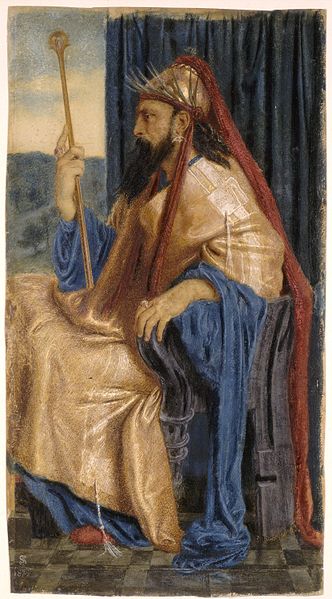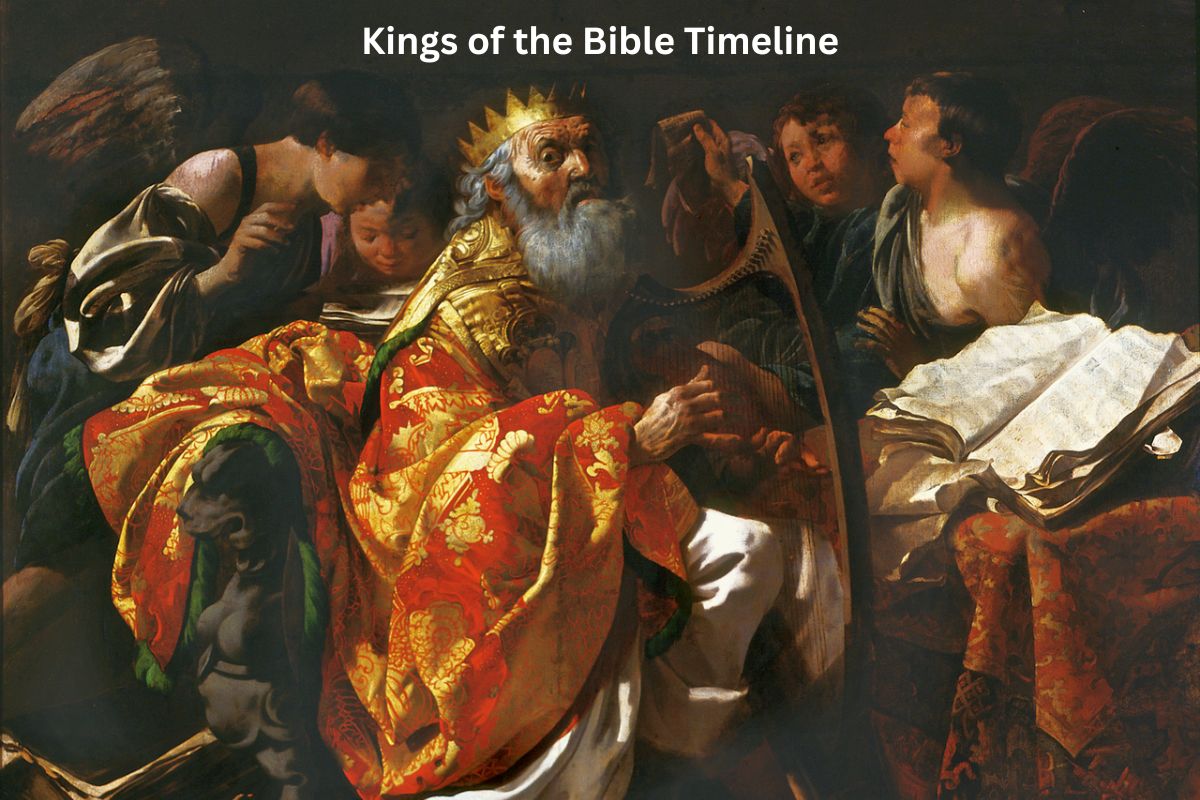In the biblical timeline, the kings of Israel and Judah played pivotal roles in shaping the history and destiny of the ancient Hebrew people.
From the establishment of the monarchy under Saul to the reigns of renowned figures like David and Solomon, and the challenges faced by subsequent rulers, each king left a unique mark on the religious, political, and cultural landscape of the time.
In this exploration, we delve deeper into the lives and legacies of these biblical monarchs, from their triumphs to their tribulations, shedding light on the rich tapestry of events that unfolded in the pages of the Old Testament.
| King | Reign | Notable Events |
|---|---|---|
| Saul | Around 1020-1000 BCE | First king of Israel, anointed by Samuel. |
| David | Around 1000-961 BCE | Conquest of Jerusalem, establishment of capital. |
| Solomon | Around 961-922 BCE | Building the First Temple, known for wisdom. |
| Rehoboam | Around 922-915 BCE | Division of Israel into northern and southern kingdoms. |
| Jeroboam I | Around 922-901 BCE | First king of the northern kingdom of Israel. |
| Asa | Around 911-870 BCE | Religious reforms and removal of idolatry. |
| Ahab | Around 874-853 BCE | Married to Jezebel, conflicts with the prophet Elijah. |
| Jehoshaphat | Around 870-848 BCE | Strengthened Judah through alliances and reforms. |
| Jehu | Around 841-814 BCE | Violent coup, zeal in destroying worship of Baal. |
| Hezekiah | Around 715-686 BCE | Religious reforms, faced Assyrian invasion. |
| Josiah | Around 640-609 BCE | Rediscovered Book of the Law, implemented reforms. |
| Nebuchadnezzar II | Around 605-562 BCE | Babylonian captivity, destruction of First Temple. |
Timeline of the Kings of the Bible
1. Saul
Reign: Around 1020-1000 BCE
Notable Events: Saul was the first king of Israel, anointed by the prophet Samuel in response to the people’s desire for a king. His reign marked a transition from the period of the Judges to the monarchy.
Also Read: King Saul Facts
Saul initially showed promise as a leader and had some military successes, but his reign was marked by conflict, including tensions with the prophet Samuel and disobedience to God’s commands. Eventually, Saul’s disobedience led to God rejecting him as king, and he died in battle against the Philistines.

2. David
Reign: Around 1000-961 BCE
Notable Events: David succeeded Saul as the second king of Israel. He is one of the most prominent figures in the Bible and is known for his military prowess, leadership, and deep faith in God.
During his reign, David conquered Jerusalem and made it the capital of Israel, bringing the Ark of the Covenant there. He is also renowned for his psalms, which are found in the Book of Psalms in the Bible.
Despite his successes, David faced challenges and personal struggles, including his affair with Bathsheba and the consequences that followed. Nevertheless, he is often referred to as a man after God’s own heart.
3. Solomon
Reign: Around 961-922 BCE
Notable Events: Solomon was the son of David and Bathsheba and succeeded his father as the third king of Israel. He is known for his wisdom, wealth, and the construction of the First Temple in Jerusalem.
Also Read: King Solomon Timeline
Solomon’s wisdom was famously demonstrated when he resolved a dispute between two women claiming to be the mother of the same child by suggesting to split the baby, knowing the real mother would rather give up her claim than harm the child. The construction of the Temple was a significant religious and political achievement.
Solomon’s reign, however, was not without problems, as he heavily taxed the people and allowed the worship of foreign gods due to his many foreign marriages, which led to his later downfall and the division of the kingdom after his death.

4. Rehoboam
Reign: Around 922-915 BCE
Notable Events: Rehoboam was the son of Solomon and the grandson of David. He became the fourth king of Israel, ruling over the southern kingdom of Judah.
His reign is notable for the division of the united monarchy into two separate kingdoms: the northern kingdom of Israel, ruled by Jeroboam I, and the southern kingdom of Judah, which Rehoboam himself ruled.
This division occurred due to the heavy taxation and forced labor that Solomon had imposed on the people, and Rehoboam’s unwillingness to lighten this burden. The division of the kingdom marked a significant turning point in Israel’s history.
5. Jeroboam I
Reign: Around 922-901 BCE
Notable Events: Jeroboam I became the first king of the northern kingdom of Israel after the division. He is best known for his efforts to establish religious centers in the northern kingdom to prevent his subjects from traveling to Jerusalem in the southern kingdom to worship, as he feared that this would lead them to reunite with Judah.
Unfortunately, Jeroboam introduced idolatrous practices and set up golden calves for worship, which went against God’s commandments. His reign was marked by disobedience to God, which led to consequences for the northern kingdom.
6. Asa
Reign: Around 911-870 BCE
Notable Events: Asa was a king of Judah, ruling in the southern kingdom. His reign is notable for his efforts to reform the religious practices in Judah.
Asa sought to remove idolatry and false worship, and he is praised for his dedication to the worship of the true God. He also fortified cities and strengthened the military of Judah.
One of the most significant events during Asa’s reign was a conflict with the Ethiopian army led by Zerah the Cushite, which resulted in a miraculous victory for Judah. This victory was seen as a confirmation of Asa’s trust in God.

7. Ahab
Reign: Around 874-853 BCE
Notable Events: Ahab was a king of Israel, known for his marriage to Jezebel, a Phoenician princess who promoted the worship of the god Baal in Israel. Ahab’s reign was marked by significant religious and political conflicts, especially with the prophet Elijah.
Elijah confronted Ahab and Jezebel’s support of Baal worship and their persecution of Yahweh’s prophets. One of the most famous events during Ahab’s reign was the showdown on Mount Carmel, where Elijah challenged the prophets of Baal to a contest to prove the true God.
This event resulted in a dramatic display of God’s power and led to a temporary resurgence of Yahweh worship in Israel.
8. Jehoshaphat
Reign: Around 870-848 BCE
Notable Events: Jehoshaphat was a king of Judah, the southern kingdom, known for his efforts to strengthen his kingdom through alliances and administrative reforms. He initiated religious reforms to bring the people back to the worship of Yahweh and appointed judges throughout the land to ensure justice.
Jehoshaphat is also noted for his military successes, including victory over a vast coalition of enemies. However, his willingness to form alliances with the northern kingdom of Israel, including the infamous alliance with Ahab, led to criticism and challenges from the prophets.
9. Jehu
Reign: Around 841-814 BCE
Notable Events: Jehu became king of Israel through a violent coup, which was orchestrated by the prophet Elisha as a means of eradicating the wicked rule of Ahab’s family.
Jehu is known for his zealous efforts to destroy the worship of Baal in Israel, which involved eliminating the prophets and priests of Baal.
While he took actions to remove idolatry, his reign was also marked by political instability and violence, as he executed numerous individuals to secure his rule. Despite his initial zeal for God, Jehu’s descendants did not follow in his footsteps, and idolatry persisted in Israel.
10. Hezekiah
Reign: Around 715-686 BCE
Notable Events: Hezekiah was a king of Judah, the southern kingdom, who is remembered for his religious reforms and his resilience in the face of the Assyrian threat.
Hezekiah removed idolatrous practices, restored the worship of Yahweh, and reopened the doors of the Temple in Jerusalem, which had been closed during his father’s reign. He also instituted the celebration of the Passover.
One of the most significant events during Hezekiah’s reign was the Assyrian invasion led by Sennacherib. Hezekiah sought divine guidance and was miraculously delivered from the siege of Jerusalem. This event is described in the Bible as an angel of the Lord striking down the Assyrian army, saving the city.

11. Josiah
Reign: Around 640-609 BCE
Notable Events: Josiah was a king of Judah, the southern kingdom, known for his extensive religious reforms and efforts to return the people to the worship of Yahweh.
His reign is described in the Bible as a time of rediscovery of the Book of the Law (likely Deuteronomy), which had been lost or neglected for some time. When the Book of the Law was found in the Temple, Josiah implemented a series of religious reforms that included purging the land of idolatry, destroying pagan shrines, and reinstating the celebration of the Passover.
His dedication to these reforms earned him praise as one of the most righteous kings in Judah’s history. Tragically, Josiah died in battle against Pharaoh Necho II of Egypt while trying to prevent him from marching through Judah to assist the Assyrians against the Babylonians.
12. Nebuchadnezzar II
Reign: Around 605-562 BCE
Notable Events: Nebuchadnezzar II, often referred to as Nebuchadnezzar the Great, was a prominent king of Babylon who played a significant role in biblical history.
Under his rule, Babylon became a powerful empire, and he is known for his military campaigns, including the conquest of Jerusalem and the Babylonian captivity of the Jewish people.
Nebuchadnezzar’s most famous act was the destruction of the First Temple in Jerusalem in 586 BCE, which marked a devastating moment in Jewish history and the beginning of the Babylonian exile. The exile lasted for several decades until the Persian king Cyrus the Great allowed the Jewish people to return to their homeland and rebuild the Temple.
